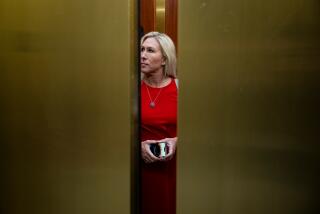Fast and Furious showdown
The confrontation between the Obama administration and a House committee over documents related to the botched Fast and Furious investigation obviously has election-year political overtones. But it also involves serious questions of policy and law. Instead of playing a constitutional game of chicken, the administration and Congress should resume negotiations toward an accommodation.
On Wednesday, the House Oversight and Government Reform Committee voted along party lines to hold Atty. Gen. Eric H. Holder Jr. in contempt of Congress for refusing to turn over internal emails and other documents related to Fast and Furious, an operation in which thousands of firearms were deliberately circulated by the U.S.Bureau of Alcohol, Tobacco, Firearms and Explosives along the Southwest border and ended up in the hands of Mexican drug cartels. The panel acted hours after President Obama asserted executive privilege in connection with the documents.
It’s tempting to dismiss this controversy as political theater on which the curtain will drop after the November election. Rep. Darrell Issa (R-Vista), chairman of the committee, is a partisan Republican who has accused the Obama Justice Department of “flawed and weak leadership.” Democrats have reflexively defended the administration, calling Issa’s investigation a kangaroo court and a witch hunt. You don’t need a long memory to recall that the parties have traded places since the George W. Bush administration, when a Democratic-controlled House committee found Karl Rove in contempt for refusing to testify about the firing of nine U.S. attorneys.
But it’s not all politics. Fast and Furious, while no Watergate, was an ill-conceived and disastrous operation worthy of congressional scrutiny. On the other hand, the courts have held that presidents need to be able to confide in aides and seek advice without fearing that those discussions will be made public, and have therefore afforded them a qualified right to withhold information. The scope of that privilege has been a matter of debate. Does it cover only communications involving the president himself or does it extend to discussions inside Cabinet agencies? One lower court suggested (too narrowly, we think) that the privilege applied only to decisions that had to be made by the president himself, such as a presidential pardon or the negotiation of a treaty.
In asking Obama to assert the privilege, Holder argued that executive privilege broadly covers “executive branch deliberative communications.” That suggests that some of the documents could be released without intruding on deliberations directly involving Obama. If that’s the case, the administration and the committee should continue to explore a possible compromise, notwithstanding election-year politics.
More to Read
A cure for the common opinion
Get thought-provoking perspectives with our weekly newsletter.
You may occasionally receive promotional content from the Los Angeles Times.






